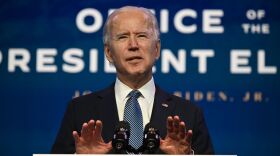Philip Ewing
Philip Ewing is an election security editor with NPR's Washington Desk. He helps oversee coverage of election security, voting, disinformation, active measures and other issues. Ewing joined the Washington Desk from his previous role as NPR's national security editor, in which he helped direct coverage of the military, intelligence community, counterterrorism, veterans and more. He came to NPR in 2015 from Politico, where he was a Pentagon correspondent and defense editor. Previously, he served as managing editor of Military.com, and before that he covered the U.S. Navy for the Military Times newspapers.
-
The president-elect made the remarks before introducing his choice for U.S. attorney general, Judge Merrick Garland.
-
Senate Republicans rejected their own president's veto on New Year's Day, and the National Defense Authorization Act is set to take effect despite President Trump and a feud over relief payments.
-
The interdisciplinary practice combines cybersecurity, intelligence, public awareness and other disciplines — and the coming years will bring more challenges and evolution.
-
On Friday, courts in Pennsylvania and Michigan shot down Trump campaign challenges to the states' elections and counting processes. And in Arizona, another case was "rendered unnecessary."
-
President Trump remains in office until early 2021 — and there will be political struggles aplenty for Washington and the outgoing chief executive before Inauguration Day.
-
Voters and national security officials are focused as never before on assuring the security of the election. Here's what you need to know in the final days of voting.
-
Two clandestine wars are being fought over U.S. election security: To protect voting and the election but also how much Americans learn about what's being done. Sometimes both break into the open.
-
A number of high-ranking Democrats have already said they would not consider an election delay, making the prospect extremely unlikely.
-
The former national security adviser avoided talking to Congress about what he knew when it was convened for impeachment — abetted by Republicans. Now he tells the story in a new book.
-
The two parties differ in the basic ways they perceive and frame myriad aspects of practicing democracy, especially when it comes to voting.










